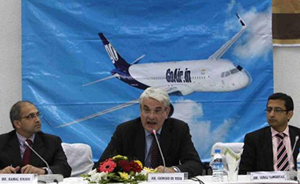 New Delhi, Jul 1: The rupee's slide could well mean sky high domestic fares this festive season. Almost all airlines have warned that the dollar's gravity-defying act has added to their costs. Since the July-September quarter is low travel season when airlines lower charges to attract passengers, fares in the October to mid-January period would be 'adjusted' significantly upwards to make up for the falling rupee's impact.
New Delhi, Jul 1: The rupee's slide could well mean sky high domestic fares this festive season. Almost all airlines have warned that the dollar's gravity-defying act has added to their costs. Since the July-September quarter is low travel season when airlines lower charges to attract passengers, fares in the October to mid-January period would be 'adjusted' significantly upwards to make up for the falling rupee's impact.
Low-cost carrier GoAir, which is India's smallest schedule airline with 15 aircraft, estimates an additional expense of Rs 30 crore per annum for every rupee depreciation. The impact on the big boys—Air India, Jet and IndiGo that have almost 100 aircraft in their fleet— and SpiceJet can well be imagined. Besides fuel, other expenses on aircraft leasing, engine maintenance are also dollar denominated.
"The reduction in fares during the lean travel July-September season will not be as much as all airlines are bleeding. The fall will be limited to 10-15% instead of previous years when it was as high as 25%. The only solution for us is to have high fares in the October-December quarter to cut losses in this fiscal. People will do well to book as much in advance for travel in that period as spot fares then will be high," said the CEO of a leading airline.
GoAir CEO Giorgio De Roni recently told TOI that airlines will avoid "crazy pricing" in the lean travel months this time and not do what has been done in the past. "The costs have gone up (due to rupee's fall) but I do not expect fare hike in July-September season. However, I do not expect airlines to go in for crazy pricing either. I hope the rupee recovers soon."
Another airline's head said falling rupee had all but wiped out the entire positive impact of the crude cooling off. "Almost 70% of an airline's expenses is in dollar terms, be it expat salaries, leasing, aircraft and engine maintenance contracts. In the last month alone, our operating costs have risen by 10%. Now, an airline can offer low fares only if it wishes to end up like Kingfisher," the official said."
Prices of aviation turbine fuel or jet fuel have gone through the roof due to the combination of high base tariff by oil PSUs and sky high sales tax rates of state governments. As a result, ATF rates in India for domestic flights are among the highest globally.
"Neither the state governments have lowered sales tax, nor has the centre categorized ATF as a declared good that could have led to a uniform low tax rate across the country. ATF accounts for over
half of an airline's operating cost and they will pass on the increased cost burden to flyers through higher fares," said an official.





Comments
Add new comment